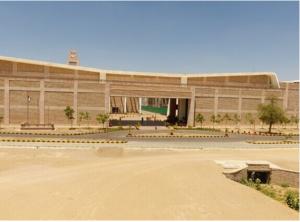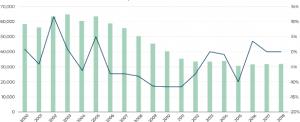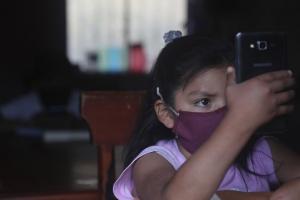Iran’s Ministry of Science, Research and Technology said this week that students at institutions under its remit – the majority of public universities – will be denied educational and other services if they do not abide by strict rules enforcing wearing the hijab or headscarf on campus.
The announcement has been seen as the regime’s pushback against widespread flouting of the country’s compulsory hijab rules on campus.
“All universities and higher education institutions under the Ministry of Science, Research and Technology will not be obliged to offer educational, welfare and other services to the few students who do not abide by the law and regulations of the universities in this regard,” the ministry said in a statement on Monday carried by Iran’s Mizan News Agency and other outlets.
In a similar move, medical colleges, which come under the remit of the Ministry of Health and Medical Education, were also ordered to bar students from educational and welfare services, an official from the Ministry of Health and Medical Education said this week.
‘Welfare services’ would include university canteens and other services, students noted.
The Ministry of Education on 2 April published guidelines for institutions calling on teachers to pay special attention to the hijab. It said teachers should use textbooks to explain the need for the hijab and female ‘chastity’.
Student groups in Iran have reported that women students in the capital Tehran and in the city of Shiraz have been summoned to the universities for mandatory counselling sessions on wearing the hijab, according to the Shiraz University notice made public by Iran’s Student Union Councils.
“Removing the hijab and not wearing proper student clothing” were described as “violations” in the notice, which also said the students concerned had not observed the compulsory dress code and “social behaviour”. It is unclear who reported the individual students to the university authorities.
The student union called the sending of these summonses by the Shiraz University administration another action to “suppress” students who are “fighting for freedom”; it described the summonses as “reprehensible and unjustifiable”.
The union also published a text message from Soore University, Tehran, sent to students on 7 March calling on them to attend ‘mandatory’ cultural workshops. The message said absence from the workshop will mean the student will not be able to appear at the end of semester exams.
Hardline calls to enforce hijab
The move to bar women students from campus if they do not adhere to the strict dress code comes as hardline supporters of the regime have called for stricter measures because women walk openly in the streets and on campus without headscarves in defiance of the rules.
The hijab became compulsory for women after the 1979 revolution which lays down that women must fully cover their hair in public.
The so-called ‘morality’ police, which enforced the dress code, have largely disappeared from the streets as the authorities fear enraging the public further after widespread protests in the streets and on campuses after the death in custody of Mahsa Amini in September 2022 for wearing the hijab improperly.
Larger street and campus protests have died down in recent weeks. Many arrested students have been released, but only allowed back on campuses after signing promises to obey the rules, including the rules on wearing the hijab.
However, in the face of persistent contraventions of the rules, some hardliners have even suggested the military and paramilitary (Basij) forces be used to combat ‘bad hijab’ wearing.
They include Mohammad Aghamiri, a member of the Tehran City Council, who suggested during a 4 April meeting they be brought in to enforce proper wearing of the hijab.
Top leaders, including Iran’s Supreme Leader Ali Khamenei and President Ebrahim Raisi, this week have been reinforcing the call to adhere to mandatory hijab rules. “The hijab protects the individual and society from damage and deviations,” Raisi said on 1 April. “Today the hijab is a legal issue.”
Chief Justice Gholamhossein Mohseni Ejei said on 2 April that women who appear without the hijab in public would be “prosecuted without mercy”, in remarks carried by several Iranian news agencies.
New dress code law
A new law to enforce the Islamic dress code is expected to be tabled before parliament in the coming weeks.
Dr Sahar Maranlou, a lecturer in the school of law at Essex University in the United Kingdom, wrote recently: “Beyond the discriminatory aspects of the mandatory dress code, one important legal issue is that the crime of ‘bad hijabi’ or ‘improper hijab’ is not defined by the law. Because the law is very loosely drawn, enforcers such as the morality police can choose to interpret it differently and crack down on women in various ways.”
Hardline lawmaker Hojjat ol-Eslam Hossein Jalali, a member of the Iranian parliament’s Cultural Committee, said on 2 April that according to the planned legislation punishments for flouting the hijab will include cash fines from IRR5 million (US$118) to IRR30 billion (US$710,000). Other penalties could include revocation of drivers’ licences and passports.
The penalties will apply to passengers travelling in vehicles who do not abide by the hijab rules at restaurants, in government organisations, schools and universities, airports and public transport terminals, in cyberspace, as well to celebrities, and on the streets and other public arenas, Jalali said.
Jalali said 37 different government organisations responsible for implementing the current hijab law had received instructions to enforce it.
Officials had previously said rather than using morality police to patrol the streets and make arrests or issue warnings, the new law would eliminate ‘physical encounters’ with women as a means of enforcement. Instead, street and public transport CCTV surveillance footage and facial recognition software would be used to identify rule-breakers.
“It is possible to notify non-hijab wearers in the form of a text message that they did not observe the hijab rule and that they must respect the law,” Jalali said in an interview with Iranian media, adding that after two warnings the government would move to block the bank account of the offender as a way of punishing them.
Lawmaker Bijan Nobaveh, also a member of the Iranian parliament’s Cultural Committee, said during a public meeting in parliament on 23 March that blocking the mobile phone use and internet usage of women who do not conform to the hijab rules would be one of the punishments under the proposed law, Iran’s Mehr News Agency reported.

Source link: https://www.universityworldnews.com/post.php?story=20230406075506250















































































































































































































